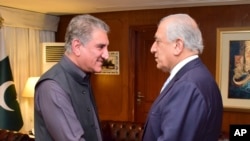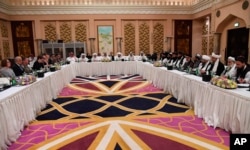The U.S. envoy assigned to promote a negotiated resolution to the 18-year-old war in Afghanistan has held talks with top officials in neighboring Pakistan and briefed them on his recent meetings with Afghan and Taliban leaders.
Afghan-born diplomat Zalmay Khalilzad landed Friday in Islamabad after spending five days in Kabul. During his stay in the Afghan capital, he interacted with government officials, opposition politicians and civil society representatives to encourage them to form a representative team of negotiators for a possible intra-Afghan peace dialogue with the Taliban.
Pakistani officials said Khalilzad held delegation-level talks with top foreign ministry officials and that Islamabad reiterated its commitment to his peace mission. According to officials, Khalilzad said an intra-Afghan dialogue "was a vital component" of the reconciliation process. The U.S. envoy later met with the Pakistani military chief, General Qamar Javed Bajwa, said an army statement.
Khalilzad's team has held five meetings with Taliban representatives, mostly in Qatar, since late last year to discuss a possible U.S. troop drawdown from Afghanistan - in return for assurances that areas under the insurgent group's control would not be allowed to become a haven again for international terrorist groups.
Pakistan takes credit for arranging ongoing U.S.-Taliban talks. Afghan and U.S. officials have long accused the neighboring country of sheltering Taliban leaders and covertly supporting the insurgents, charges Pakistani officials reject.
Khalilzad and Taliban delegates early last month reached a preliminary draft agreement on troop withdrawal and counterterrorism guarantees after 16 days of marathon talks in Qatar. They are expected to resume talks later this month to try to finalize the deal.
Observers remain skeptical on whether Khalilzad's engagements with the insurgents will lead to an intra-Afghan dialogue to bring an end to Washington's longest ever overseas military intervention. U.S. President Donald Trump on Tuesday described the war as "unfortunate" and "ridiculous."
Afghan President Ashraf Ghani maintains that his elected government must lead peace talks with the Taliban. Theinsurgent group refuses to talk because it rejects the Afghan government as an illegal entity and a product of
Pakistan's alleged links with the Taliban also have been at the center of tension with the Ghani government.





